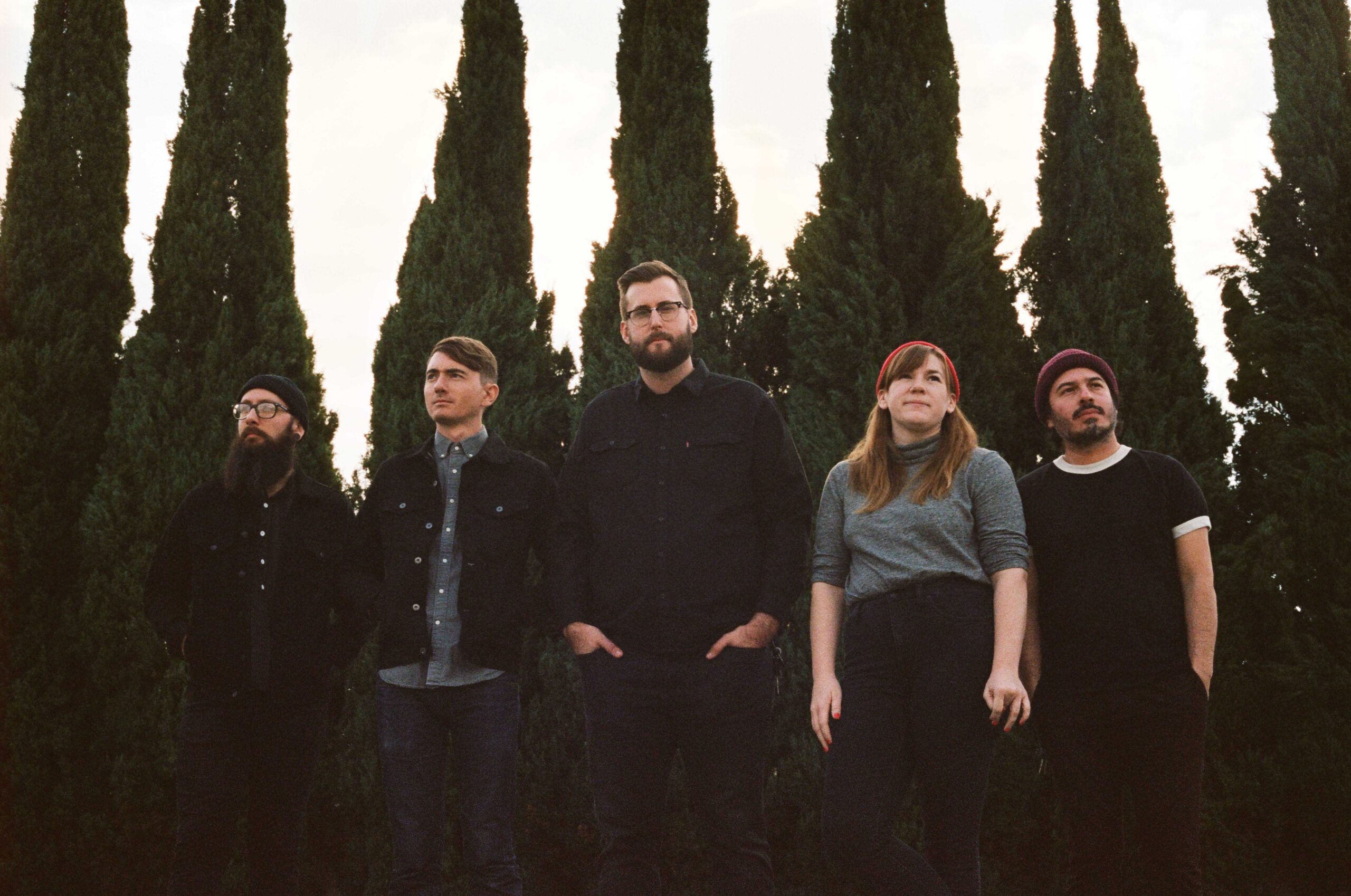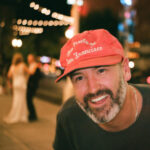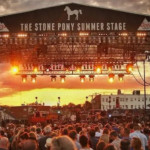Interview: Spanish Love Songs
Posted: by The Alt Editing Staff

“No cancer, no crash, it better all go as planned, or one day soon we’re not gonna get by,” sings Dylan Slocum in a song called “Losers II,” in a lyric that would presage the two events that would come to define 2020 for most Americans: the outbreak of the coronavirus and the subsequent economic meltdown. It’s from the band’s most recent album, Brave Faces Everyone, which dropped in February and is the most prophetic album of the year (at least). When I mention this to Dylan, he laughs, “Fuck, I wish I knew what was coming, because I probably would’ve just kept my job.” Contrary to his stark and heart-wrenching lyrics, in conversation, Dylan’s warm and quick to joke. I chatted with him about the making of Brave Faces Everyone, the band’s activities during the pandemic, and how not to copy The Wonder Years.
What’ve you been doing during the pandemic? How’ve you been keeping yourself sane?
I haven’t been. That’s maybe the good answer. For the first part of the pandemic, we’ve really focused on the Patreon that we launched. For the second part – I have a Song Shop where I write custom ‘boutique’ songs for people. It’s been good. Meredith and I were staying in Iowa – the band is pretty scattered right now. We lost power for a few weeks and we lost internet for about a month, so we just packed up and moved because our entire lives are now on the internet. We just got to Nashville maybe two weeks ago. When the album came out we were supposed to be touring this entire year, so all of us gave up our apartments and moved into family members’ guest rooms or basements. We were gonna be gone. We were staying at Meredith’s parents’ because we were gonna be home maybe a combined month of the entire year. When the pandemic hit, it was like, “Oh, not only can we not do our jobs, we also have to live at home.” We were super lucky to have that. But after about six months, Kyle just moved out, got his own place. We just moved out, got our own place. We were losing our minds a little bit. We’re adults, but we also can’t do our jobs. But now we’re back. I think we did the dumbest thing, which is move during a pandemic. At some point though, we had to set up and run our business, quote-unquote. We were recording from their living room, which I felt so bad about, because I basically set up a small studio in there. It’d be the middle of the day and I’d be just shouting a Nickelback cover, and then I’d walk by and apologize and they’re like, “No, it sounds great.” Yeah, I’m sure this Nickelback cover is really doing it for you guys.
I wanted to talk about the Patreon. You were the first band that I follow who started one – I’m not sure if you were the very first band who started one.
We weren’t the first. We had wanted to do it for a few years. We definitely weren’t the first. I think the first person I really saw doing it was Zola Jesus, and she really owned it and pivoted her career that way. Right before we launched I know Manchester Orchestra launched one. I was like, “Fuck, we’re not gonna be able to compete with that.” Then Circa Survive launched one, and I was really like, “Shit, nobody’s gonna wanna do ours.” But I think in our little corner we’ve done pretty well with it, and I think we’re doing a good job with it, which is nice. It’s a lot of stress.
If you’d been planning it for a while, was it always going to be the same sort of things it is now, exclusive sets, covers, B-sides, and whatnot?
Yeah, exactly. Like a year ago I said it to Kyle and the rest of the band. It was just an inkling I had. Maybe it could work. We didn’t know how the label would react or this or that. It just seemed like a way – The Wonder Years had their fan club which was super cool and super annoying, like a Patreon is – so I had the idea that it’s like a fan club, but we take out some of the administrative work. We have to sacrifice a small percentage for that, but I am all about paying someone to do stuff I’m not good at doing. I won’t host a website well or process payments. It was something we toyed with, and when that Wonder Years tour fell through, I texted our manager and said we had to launch the Patreon. For a while I’d toyed with putting a solo album out through Patreon, which would be free of any label stuff, but it pivoted right back to the band.
Have you been writing new stuff then, either just yourself or with the band, through this whole thing?
I usually don’t write for the band for a period of time after a record comes out – Brave Faces came out in February – to distance myself from what we were doing. I have to have some grand idea in my head. The Song Shop’s taken up a lot of my creative time. I’ve written maybe an album and a half of Song Shop songs, which is wild to think about. I’ve recently pivoted back, wrote something a few weeks ago, looked at it and decided it’s a band song. The Patreon also, with the covers every month, the reimagined songs every month, the livestreams every month, it takes up a lot of time. We’re not just trying to put everything behind the paywall. We’re doing something. We’re working on music of sorts. I can’t say what it is.
I wanted to ask you, now that we are a few months removed, how you felt about the reception to Brave Faces, Everyone.
Oh, it’s been amazing. We had a good response to Schmaltz, and when we signed to Pure Noise, it kept growing. We felt a little bit of pressure but largely just did our own thing, wrote an album that satisfies us hoping people will like it, and it seems people like it. It’s a great feeling. I don’t know how else to describe it. It’s weird to do a job and not fail at it. Most of life is failure. I grew up playing baseball, so I’m big on the idea of failure. A good baseball hitter fails seven out of ten times. I’m huge on the idea. But it’s weird when you actually get a hit – not that the album’s a hit, but the baseball type hit. It’s weird because the album’s been received well and we’re on some kind of trajectory, but it never seems enough. I have a hard time gauging how well the album’s been received other than people on the internet, you know? I don’t know how quote-unquote big our band is, because our usual measurement is how many people see us live, and we can’t do that this year. I don’t like measuring based on – if the last decade’s proved anything it’s that the amount of people who follow you on the internet doesn’t fucking matter. The amount of people who listen to you on Spotify kinda matters, but it also doesn’t tell the whole story. We’re a band whose fans buy the album and listen to it, I would argue, rather than seek us out to only listen to on Spotify. Our numbers have always been lower than the album sales would assume. I don’t know what to trust. But who the fuck cares? People are showing up, and we can get paid to do our job. We’ll play for three people.
The title track incorporates all these lyrics from songs on the record and some from the last record. What was the idea behind that?
As far as the references to this record, when I first set out and was writing the record, I had all these disparate ideas for songs, these half-ideas. I ended up writing the title track third or fourth and put in a lot of references to things I wanted to use, which helped me structure the story. When we ended up recording, though, we cut out most of it. There’s a ton more references. There’s this huge bridge. I remember the first time I played it for Meredith, she was like “Wow, that’s a lot of words.” That was her review of the song, so we ended up cutting half of it. So in the studio, we were trying to figure out the part where all these lyrics resurface. The band went out to lunch, and I started playing this Jimmy Eat World “The Middle” guitar solo over it, and I was so fucking happy because I don’t play guitar solos. I was like, “I feel in my heart that there needs to be a guitar solo here.” They came back and were like, “That’s fucking stupid,” and they scrapped the idea without any input. They just said no. That’s not usually a good idea to say to me in the studio, because if you say that, I’m like, “No, fuck you, this is what we’re doing.” For whatever reason this time I was like, “Yeah okay, I hate guitar solos anyway.” So when it got to that part to record I just started singing the chorus to every other song on the record and Kyle’s like, “What are you doing?” And I just told him to run it again and I did every other song on the record in that key. It helps that half, three quarters, of the album’s in the same key. I started just singing and did it for ten minutes straight, came out and said, “Cut that together in an interesting way.” We did that instead of a guitar solo. As far as the references to the old songs, that’s just something I like. I feel like it helps with context, helps to fill out the world the songs are occupying. I think the first lyric for that song, I think, “I woke up and didn’t feel better,” I wrote that right after Schmaltz. It was meant to be a sequel or very little. The last song is “Aloha,” which is like, “You might wake up but you’ll never feel better,” and it’s like, “Yeah, I woke up, didn’t feel better.”
Something I like about your albums is the way closers always tie in to another song on the album, and this feels like a bigger-scale version of that.
Yeah, and it sucks. Well, it doesn’t suck, but it’s tough, because you wanna work towards that since it’s a fun idea and helps really bookend the stories, but you also don’t wanna do “I Just Want to Sell Out My Funeral,” because that song did it perfectly. That’s something I was very aware of. They’d be like, “Why don’t we just revisit everything?” I said no. The Wonder Years nailed that. What’s our idea? Kyle said he pictured it as a wall of sound that washes over you and helps you reflect before the last lines of the album which are hopeful and heartbreaking and one of the few times I’ve cried listening to my own words. The first time we listened to the album and got to those last lines I was crying and it was so dumb and douchey. So it’s just supposed to be this wall of sound where you’re just reflecting, and these snippets come in and out and just wash over you and I think Kyle killed it in that regard. It’s better than me playing a guitar solo.
Did you write this record specifically to make a full statement? It definitely seems like all the songs work together thematically.
Yeah, absolutely. Every album has to have some grand idea – not a good idea. Giant was about my divorce and the relationship after my divorce and how fucking weird this is. For Schmaltz I said I would not write any songs about relationships. It ended up just becoming an album about how much I suck. For this album, I know I suck and I know I’m depressed, so the big thing for this album was empathy. Writing about empathy is a weird thing. It involves empathizing. Putting the listener in someone else’s skin became the goal. It’s like, “Hey guys, it sucks for everyone – not everyone, most – especially if you’re a working- or lower-class American.” I can speak to knowing people in southern Georgia or rural California – not to speak for them, but to say these are stories we’ve heard, people we know. Everyone’s hurting, so how do we address it without just hating each other? As a person whose first tendency is to hate everyone he meets, it’s a bad habit.
The one song I felt was an outlier musically and – obviously I don’t know the impetus for the song – but lyrically too it seems is “Dolores.” I was wondering how that one came together.
I had some lyrics sketched down and then the Odessa shootings happened. We’ve touched on mass shootings in the past, but not ever directly. It felt like a story that fit. If we’re going on empathizing, it’s empathizing on a grand scale. It’s trying to understand pain and anger on a grand scale, which sounds really pretentious. Musically, it was always much different than the other songs. We ended up redoing it into its current form the day we started recording the album. We wrote the entire song. Terrible idea. To the point that we recorded the drums before it was fully arranged. We wanted to do something a little different, take you in a different direction – maybe where we’ll head next, maybe not – just to break up the general wall of sound, pop-punk-adjacent thing we do, pull on some other influences. The way a good slow song can break up an album, I think of “I Can Feel a Hot One” by Manchester Orchestra, which just sorta breaks up the flow and stops you in your tracks. It’s a good one because it’s a controversial one. I know a lot of people that don’t like that song or like it but don’t want to listen to it. That’s nice because it means you’re thinking about it. You aren’t just like, “Let’s let this passively play over me.” If you don’t like it that’s fine. It’s just something different, because we don’t wanna do the same thing over. And I know that’s funny because people say it all sounds the same, but I don’t know what to tell you. To me it doesn’t. Yes, is it all intentionally in two keys? Does that – in my head – play into the larger themes of the album? Yes. Does somebody who wants to talk shit on the internet get that? No, they’re just like, “Every song sounds the same. Every song’s in the same key, what talentless musicians they must be.” That’s okay. We try to do everything intentionally, even down to guitar or key parts. A lot of this album was about how to cut it down. If you listen to Giant – even parts of Schmaltz – there are a lot of parts where Kyle and I are playing completely different things almost all the time. This album there’s no leads at all. The keys are playing the leads, say. It’s all intentional. Whether it’s good is a different story.
It even seems to me this moves away from the sort of catchy riffs pop-punk of your older stuff and is more spacious.
Yeah, the big thing was to give things room to breathe. If we’re already such a quote-unqoute emotional band, let the emotions breathe instead of relying on a riff or relying on me saying forty extra words I don’t need to say. The bridge of “Generation Loss” is a good example – there was a whole bridge in there where I was saying a bunch of words and it was cool and I liked the lyrics but we got to the studio and everyone was like, “What if we just let the music do the talking?”
If you went back to the Dylan of Giant Sings the Blues, and you played him Brave Faces, Everyone, how do you think he’d feel about it?
He’d be so psyched. Every album we’ve done is me getting closer to the actual music I enjoy, which is weird. You set out to write a song – you hear it in your head and that’s the most perfect way you’ll ever hear it. When you play a chord over it or put it out into the world you’re making certain sacrifices on it, whether at the expense of others’ opinions or you not being good at recording it or at the expense of someone hearing it on their iPhone not on speakers. I’d be psyched, because we’re getting better, me and the band. I have a hard time listening to Giant because so much of it is like, “first idea, best idea,” and it’s not intentional. There’s phrases in there that I sing just because that’s what I wrote and there’s no thought behind it. The band was a joke and we didn’t expect to do anything. Schmaltz was a push against that. We had free studio time because Kyle was working so we spent like six months on it like, “Whatever, we’ll just have fun.” There was some intention. That’s why with this one, it was this is what we’re doing. We did pre-production for the first time. There were lots of people we didn’t wanna let down. In the past there was just the five of us, but now there’s like twenty – it’s not the end of the world for them if we write a bad album, but it’s annoying for them. We’re not the level of band where people lose money if we write a bad album, but we are the level of band where it sucks if we write a bad album. We’re like, “People will tell us to go away.” We’re all basically in our 30s, so we joke that we’re too old to write a bad album. There’s no room for failure, which is funny as someone who loves failure. This is a tightrope, and if you fail, that’s it. I’d be psyched if I heard this at 26 – I started this band too damn old – and I’d be hyped I’m still doing this in 2020. Although that means my other career failed as well – nah, I’d be hyped with the lyrics especially, that I feel like a mature songwriter. I’m not a teenage boy writing fucking love songs at 26.
—
Zac Djamoos | @gr8whitebison
The Alternative is ad-free and 100% supported by our readers. If you’d like to help us produce more content and promote more great new music, please consider donating to our Patreon page, which also allows you to receive sweet perks like free albums and The Alternative merch.










